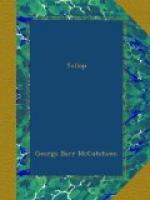Counsel: “I see. Now, isn’t it a fact, Mr. Yollop, that you laid the revolver down to go to the assistance of this defendant who was in a fainting condition?”
Yollop: “No, it isn’t. He was all right.”
Counsel: “Don’t you know that you laid it down because you were convinced in you own mind that he was physically unable to take advantage of it? That he was in no condition to use it?”
Yollop: “No.”
Counsel, with a pitying look at the jury: “He was still the big, strong, able-bodied man that you had knocked down with your brawny fist, eh?”
Yollop, mildly: “He may have been a little sleepy. I was.”
A Bailiff: “Order! Order!”
Counsel, severely: “Now, Mr. Yollop, will you tell this jury why, after you had found it so simple to knock the defendant down and disarm him earlier in the evening, you failed to repeat the experiment when he had you covered the second time?”
Yollop: “The first time I acted on the spur of the moment, and under stress of great excitement. I had had time to collect my wits by the time he gained possession of the revolver. I wasn’t as foolhardy as I was at the beginning. I was afraid he would shoot me if I tackled him again.”
Counsel: “Isn’t it a fact that he appeared much stronger and not so weak and listless as when you first encountered him?”
Yollop: “I didn’t notice any change in him.”
Counsel: “Didn’t you testify awhile ago that while he was sitting at your desk, under cover of the gun, he ate a whole box of chocolate creams,—at your generous invitation?”
Yollop: “Yes. He ate them, all right.”
Counsel: “Wouldn’t you, as an intelligent man, assume that a pound of chocolates might have the effect of restoring to a half-starved man a portion of his waning strength,—at least a sufficient amount to encourage him to put up some kind of a fight against you?”
The State: “We object. The question calls for a conclusion on the part of the witness, who does not even pretend to be an expert or an authority on pathological—”
Counsel: “But he does pretend to be an intelligent man, doesn’t he? I submit, your honor, that the question is proper and I—”
The Court: “Objection sustained. The witness may state that the defendant ate a box of chocolate creams. He cannot give an opinion as to the effect the chocolates may or may not have had on him.”
Counsel: “Exception.”
Mr. Yollop was on the stand for half an hour longer. Counsel for the defense was driving home to the jury the impression that Smilk was a poor, half-starved wretch who had gone back to thieving after a valiant but hopeless attempt to find work in order to support his wife and children. He announced, in arguing an objection made by the State, that it was his intention to prove by the man’s wife that Smilk was a good husband and was willing to work his fingers off for his family, but that he had been ill and unable to find steady employment.




